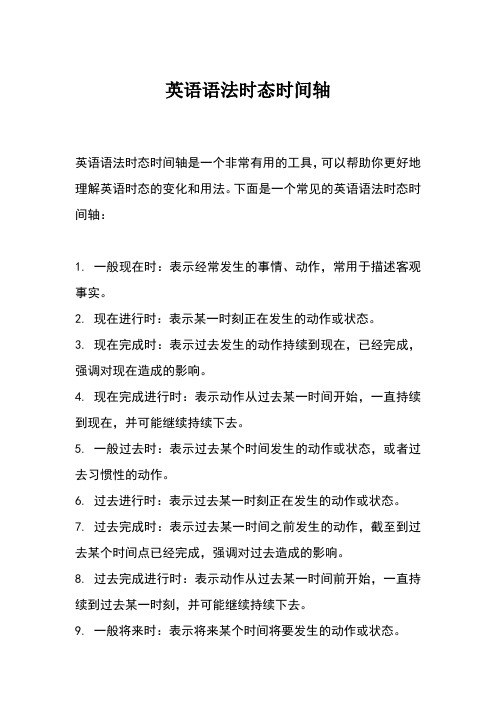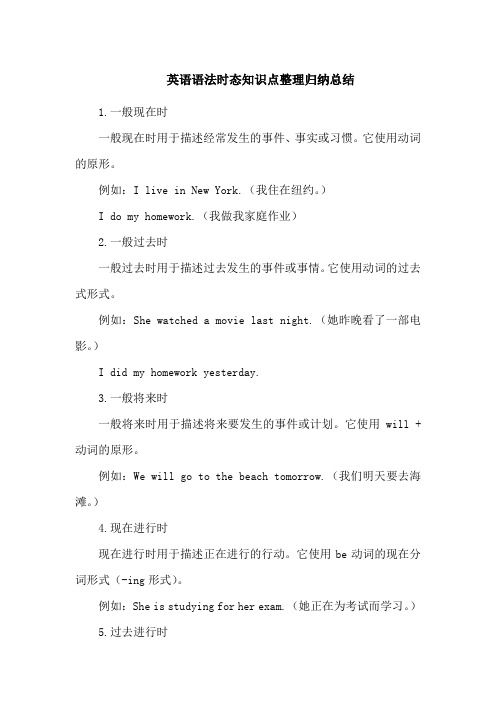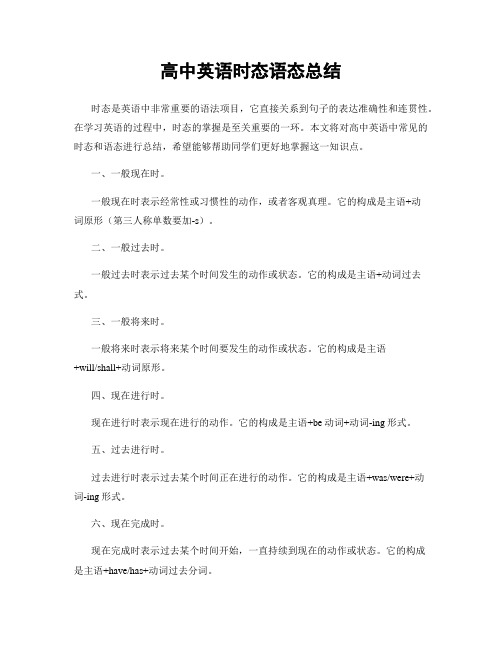高考英语语法一般现在时、现在进行时、一般将来时、将来进行时的用法及区别
英语语法时态时间轴

英语语法时态时间轴
英语语法时态时间轴是一个非常有用的工具,可以帮助你更好地理解英语时态的变化和用法。
下面是一个常见的英语语法时态时间轴:
1. 一般现在时:表示经常发生的事情、动作,常用于描述客观事实。
2. 现在进行时:表示某一时刻正在发生的动作或状态。
3. 现在完成时:表示过去发生的动作持续到现在,已经完成,强调对现在造成的影响。
4. 现在完成进行时:表示动作从过去某一时间开始,一直持续到现在,并可能继续持续下去。
5. 一般过去时:表示过去某个时间发生的动作或状态,或者过去习惯性的动作。
6. 过去进行时:表示过去某一时刻正在发生的动作或状态。
7. 过去完成时:表示过去某一时间之前发生的动作,截至到过去某个时间点已经完成,强调对过去造成的影响。
8. 过去完成进行时:表示动作从过去某一时间前开始,一直持续到过去某一时刻,并可能继续持续下去。
9. 一般将来时:表示将来某个时间将要发生的动作或状态。
10. 将来进行时:表示将来某一时刻将要发生的动作或状态。
11. 将来完成时:表示将来某一时间已经完成的动作。
12. 将来完成进行时:表示动作从将来某一时刻前开始,一直持续到将来某一时刻,并可能继续持续下去。
这个时间轴可以帮助你更好地理解英语时态的变化和用法,也可以帮助你更好地掌握英语语法。
二.九种基本时态

英语时态用共有十六种时态,其中常用的有8种,它们是:一般现在时、一般过去时、一般将来时、现在进行时、现在完成时、过去进行时、过去完成时和过去将来时。
1.一般现在时概念: 表示经常发生的动作或经常存在的状态。
常和always , often , usually , sometimes , every day 等表时间的状语连用。
如:1) I go to school every day . 我每天都去学校。
(表经常)2) He is always like that . 他总是那样。
(表状态)构成:1) 主语+ be (am / are / is ) +……2) 主语+ 实义动词+ …1.一般现在时的构成形式如下:肯定式疑问句否定式疑问否定式I work Do i work ? I do not work Do i not work?He (She It) Does he He (she it) Does he (she it)works (she it) work? does not work not work?We work Do we work? We do not work Do we not work?You work Do you work? You do not work Do you not work?They work Do they work? They do not work Do they not work?2.一般现在时的基本用法①一般现在时常表示经常发生的动作或经常存在的状态如:I go to school every day.我每天上学。
②表示此状态时,常和always,often,usually,everyday,sometimes等表示时间的状语连用,有时候时间状语可以不表示出来如:Where do you live?你住在哪里?③由when ,while,before,after,until,as soon as 等引导的时间状语从句亦可用一般现在时态表示经常发生的动作或是状态。
英语时态语法归纳

英语时态语法归纳以下是英语时态语法归纳:1. 一般现在时(Simple Present Tense):表示现在的状态、经常发生的动作或客观事实。
- 肯定句:主语+ V (动词原形或第三人称单数形式) + 其他- 否定句:主语+ do/does not + V (动词原形) + 其他- 疑问句:Do/Does + 主语+ V (动词原形) + 其他?2. 一般过去时(Simple Past Tense):表示过去发生的动作或状态。
- 肯定句:主语+ V-ed (动词过去式) + 其他- 否定句:主语+ did not + V (动词原形) + 其他- 疑问句:Did + 主语+ V (动词原形) + 其他?3. 一般将来时(Simple Future Tense):表示将来发生的动作或状态。
- 肯定句:主语+ will/shall + V (动词原形) + 其他- 否定句:主语+ will/shall not + V (动词原形) + 其他- 疑问句:Will/Shall + 主语+ V (动词原形) + 其他?4. 现在进行时(Present Continuous Tense):表示现在正在进行的动作或状态。
- 肯定句:主语+ am/is/are + V-ing (现在分词) + 其他- 否定句:主语+ am/is/are not + V-ing (现在分词) + 其他- 疑问句:Am/Is/Are + 主语+ V-ing (现在分词) + 其他?5. 过去进行时(Past Continuous Tense):表示过去某个时刻正在进行的动作或状态。
- 肯定句:主语+ was/were + V-ing (现在分词) + 其他- 否定句:主语+ was/were not + V-ing (现在分词) + 其他- 疑问句:Was/Were + 主语+ V-ing (现在分词) + 其他?6. 现在完成时(Present Perfect Tense):表示过去发生的动作对现在造成的影响或结果,或表示过去的动作持续到现在。
英语八大时态整理笔记

英语八大时态整理笔记【最新版】目录1.英语时态的概述2.八大时态的定义与特点2.1 一般现在时2.2 一般过去时2.3 一般将来时2.4 现在进行时2.5 过去进行时2.6 将来进行时2.7 现在完成时2.8 过去完成时正文英语时态是描述动作或状态在时间上的关系的方法,它是英语语法中的重要组成部分。
英语中常见的时态有很多种,但其中八大时态是最基本且最重要的。
下面我们来详细了解一下这八大时态的定义与特点。
1.一般现在时:表示现在的习惯、事实或一般情况。
常和频度副词连用,如:often, usually, sometimes 等。
2.一般过去时:表示过去某个特定时间发生的动作或存在的状态。
常和表示过去的时间状语连用,如:yesterday, last week 等。
3.一般将来时:表示将来某个时间会发生的动作或存在的状态。
常和表示将来的时间状语连用,如:tomorrow, next year 等。
4.现在进行时:表示现在正在进行的动作或存在的状态。
常和 now, look 等连用。
5.过去进行时:表示过去某个特定时间正在进行的动作或存在的状态。
常和表示过去的时间状语连用,如:when, while 等。
6.将来进行时:表示将来某个特定时间将要进行的动作或存在的状态。
常和 will, be going to 等连用。
7.现在完成时:表示过去发生的动作对现在造成的影响或结果。
常和already, yet, just 等连用。
8.过去完成时:表示过去某个时间点之前已经完成的动作。
常和before, after 等连用。
英语语法时态知识点整理归纳总结

英语语法时态知识点整理归纳总结1.一般现在时一般现在时用于描述经常发生的事件、事实或习惯。
它使用动词的原形。
例如:I live in New York.(我住在纽约。
)I do my homework.(我做我家庭作业)2.一般过去时一般过去时用于描述过去发生的事件或事情。
它使用动词的过去式形式。
例如:She watched a movie last night.(她昨晚看了一部电影。
)I did my homework yesterday.3.一般将来时一般将来时用于描述将来要发生的事件或计划。
它使用will + 动词的原形。
例如:We will go to the beach tomorrow.(我们明天要去海滩。
)4.现在进行时现在进行时用于描述正在进行的行动。
它使用be动词的现在分词形式(-ing形式)。
例如:She is studying for her exam.(她正在为考试而学习。
)5.过去进行时过去进行时用于描述过去某个时间点正在进行的行动。
它使用be动词的过去分词形式(-ing形式)。
例如:They were playing soccer when it started raining.(当下雨时,他们正在踢足球。
)6.将来进行时将来进行时用于描述未来某个时间点将要进行的行动。
它使用will be + 动词的现在分词形式(-ing形式)。
例如:I will be working late tomorrow.(明天我要工作到很晚。
)7.现在完成时现在完成时用于描述过去发生的一系列与现在有关的事件。
它使用have/has + 动词的过去分词形式。
例如:She has visited China twice.(她已经去过中国两次。
)8.过去完成时过去完成时用于描述在过去某个时间点之前已经完成的行动。
它使用had + 动词的过去分词形式。
例如:I had already eaten dinner when he arrived.(当他到达时,我已经吃过晚饭了。
高中英语时态语态总结

高中英语时态语态总结时态是英语中非常重要的语法项目,它直接关系到句子的表达准确性和连贯性。
在学习英语的过程中,时态的掌握是至关重要的一环。
本文将对高中英语中常见的时态和语态进行总结,希望能够帮助同学们更好地掌握这一知识点。
一、一般现在时。
一般现在时表示经常性或习惯性的动作,或者客观真理。
它的构成是主语+动词原形(第三人称单数要加-s)。
二、一般过去时。
一般过去时表示过去某个时间发生的动作或状态。
它的构成是主语+动词过去式。
三、一般将来时。
一般将来时表示将来某个时间要发生的动作或状态。
它的构成是主语+will/shall+动词原形。
四、现在进行时。
现在进行时表示现在进行的动作。
它的构成是主语+be动词+动词-ing形式。
五、过去进行时。
过去进行时表示过去某个时间正在进行的动作。
它的构成是主语+was/were+动词-ing形式。
六、现在完成时。
现在完成时表示过去某个时间开始,一直持续到现在的动作或状态。
它的构成是主语+have/has+动词过去分词。
七、过去完成时。
过去完成时表示过去某个时间之前已经完成的动作或状态。
它的构成是主语+had+动词过去分词。
八、一般将来完成时。
一般将来完成时表示将来某个时间之前已经完成的动作或状态。
它的构成是主语+will/shall+have+动词过去分词。
九、被动语态。
被动语态表示主语是动作的承受者。
它的构成是be动词+动词过去分词。
十、情态动词。
情态动词包括can, could, may, might, must, shall, should, will, would等。
它们用来表示说话人的态度、情感或推测。
总结,时态和语态是英语语法中的重要内容,它们直接关系到句子的表达准确性。
在学习过程中,我们要多加练习,多加总结,才能够真正掌握好这一知识点。
希望本文的总结能够帮助大家更好地理解和掌握高中英语中的时态和语态。
新高考英语主要时态
新高考英语主要时态
一、现在一般时态
现在一般时态表示现在时刻的状态、动作或特征。
基本结构是:主语+be/助动词(do/does)+动词原形+其他。
二、过去一般时态
过去一般时态表示过去某个时间的状态、动作或特征。
基本结构是:主语+be/助动词(did)+动词原形+其他。
三、现在进行时态
现在进行时态表示现在正在进行的动作。
基本结构是:主语+be+动词-ing+其他。
四、过去进行时态
过去进行时态表示过去某个时间正在进行的动作。
基本结构是:主语+be的过去式+动词-ing+其他。
五、现在完成时态
现在完成时态表示过去发生的动作或情况,对现在有影响。
基本结构是:主语+have/has+过去分词+其他。
六、过去完成时态
过去完成时态表示过去的某个时间点之前已经完成的动作或情况。
基本结构是:主语+had+过去分词+其他。
七、现在完成进行时态
现在完成进行时态表示过去发生的动作,一直持续到现在并且还在继续。
基本结构是:主语+have/has+been+动词-ing+其他。
八、过去完成进行时态
过去完成进行时态表示过去的某个时间点之前已经持续进行的动作,并一直持续到那个时间点。
基本结构是:主语+had+been+动词-ing+其他。
九、将来一般时态
将来一般时态表示将来某个时间要发生的动作或情况。
基本结构是:主语+will+动词原形+其他。
高三英语过去完成时、将来完成时、现在完成进行时、将来进行时
课后作业一、真题演练:单句语法1. When I die, I ____________(give) everything to you.2. That was definitely not an attractive idea, so I politely declined her invitation, .____________(close) m y book and walked away.3. His fear of failure __________(keep) him from classroom games that other students played with joyousabandon.4. _______________(speak) out your inner feeling won’t make you feel ashamed, on the contrary,5. _____________(complete) the project as planned, we’ll have to work two more hours a day.6.It was raining lightly when I___61___ (arrive) in Yangshuo just before dawn.7. This cycle 48 (go) day after day:The walls warm up during the day and cool off during the night and are thus always a timely offset(抵消) for the outside temperatures.8. In 1969,the pollution was terrible along the Cuyahoga River near Cleveland,Ohio.It 61 (be) unimaginable that it could ever be cleaned up.9. Be patient!Tai Chi 66 (call) “shadow boxing” in English.It asks you to act like water:10.Unless some extra money (find),the theatre will close11.When a new day breaks,the walls have given up their heat and are now cold enough 46 (cool) the house during the hot day;at the same time,they warm up again for the night.12. In addition to their simple beauty,what makes the adobe dwellings admirable is their ability to “air condition” a house wi thout 44 (use) electric equipment.13. The adobe dwellings(土坯房) 41 (build) by the Pueblo Indians of the American Southwest are admired by even the most modern of architects and engineers.二、单选题1. When I was young, I ________ with my grandma in the countryside, which is unforgettable.A. livedB. have livedC. was livedD. had lived2. –Excuse me, is the book Gone with the Wind by Margaret Mitchell available now?-Sorry, but it _________ so well that we don’t have any in store.A. sellsB. is soldC. has soldD. has been sold3. The tourism of Linyi _________ rapid growth over the last decade. Now it’s the second most visited city in Shandong Province.A. sawB. had seenC. is seeingD. has seen4. Great changes _____place in my hometown during the past three decades.A. tookB. have takenC. were takenD. have been taken5.Leave me alone. I ________ an article all the afternoon and haven’t finished yet.A. writeB. have been writingC. have writtenD. wrote6. When the power of love _______ the love of power, the world will likely be in peace.A. overcomesB. will overcomeC. is overcomingD. overcame7. Mr. Black ________ Shanghai in a few days. Shall we have a party?A. leavesB. is leavingC. leftD. has left8. –Look, it _________ again.–Yeah. This is the third snow we __________ this spring.A. will snow, are havingB. has snowed, had hadC. is snowing, have hadD. snows, have had9. Mr. White ____ in our school for nearly forty years before he retired last month.A. workedB. has workedC. had workedD. would work10. The project ________ to developing the economy and reducing poverty when it is completed.A. has contributedB. had been contributedC. will contributeD. is contributed11. Nelson Mandela __________ peacefully at his Johannesburg home on Thursday, President Jacob Zuma said.A. diesB. diedC. has diedD. was died12. –I thought you _____________ for vacation tomorrow.-I had planned, but I have a very important meeting to attend tomorrow.A. will leaveB. are leavingC. have leftD. were leaving13. Our manager ________for Shanghai in a few days and he has asked me to find out when the earliest plane ________ next Wednesday.A. is leaving, takes offB. will leave, is taking offC. leaves, will take offD. is to leave, is going to take off14. I’m calling about the apartment you ______the other day .Could you tell me more about it?A .advertised B. had advertised C. were advertising D. will advertise15. Whenever you______a present, you should think about it from the receiver’s point of view.A. boughtB. have boughtC. will buyD. buy16. I walked slowly through the market, where people ______ all kinds of fruits and vegetables. I studied the prices carefully and bought what I needed.A. sellB. were sellingC. had soldD. have sold17. The twins, who _______ their homework, were allowed to play badminton on the playground.A. will finishB. finishC. have finishedD. had finished18. The journey was tiring! All the seats in the train _______. I had to stand all the way.A. were occupiedB. would be occupiedC. would occupyD. had occupied19. Yesterday afternoon, I ______my homework when Mary called.A. had doneB. was doingC. would doD. am doing20. Close the door of fear behind you, and you ______ the door of faith open before you.A. sawB. have seenC. will seeD. are seeing21. Tommy is planning to buy a car. By next month ,he____ enough for a used one.A. saves B .saved C. will save D. will have saved22. She was surprised to find the fridge empty; the child _____ everything!A. had been eatingB. had eatenC. have eatenD. have been eating23. Despite the previous rounds of talks, no agreement______ so far by the two sides.A. has been reachedB. was reachedC. will reachD. will have reached24. More expressways _______in Sichuan soon to promote the local economy.A. are being builtB. will be builtC. have been builtD. had been built25 After school we went to the reading-room to do some reading, only to be told that it _____.A. was decoratedB. had decoratedC. had been decoratingD. was being decorated三、语法填空(共10小题;每小题1.5分,满分15分)阅读下面短文,在空白处填入1个适当的单词或括号内单词的正确形式。
英语八大时态总结表
英语八大时态总结表时态是英语语法中非常重要的部分,它决定了句子的时间和态度。
掌握英语的八大时态对于正确理解和运用英语语法至关重要。
下面将对英语的八大时态进行详细总结。
一、一般现在时态(Simple Present Tense)一般现在时用于描述经常或一直存在的情况、习惯性的行为或现在的真理。
它的结构是主语+动词原形。
例如:1. The sun rises in the east.(太阳从东方升起。
)2. I usually go to bed early.(我通常早睡。
)3. They live in New York.(他们住在纽约。
)二、一般过去时态(Simple Past Tense)一般过去时用于描述已经发生并结束了的过去事件或状态。
它的结构是主语+动词过去式。
例如:1. She studied abroad last year.(她去年出国留学了。
)2. They visited their grandparents yesterday.(他们昨天拜访了他们的祖父母。
)3. We lived in London for five years.(我们在伦敦住了五年。
)三、一般将来时态(Simple Future Tense)一般将来时用于描述将来会发生的事件或状态。
它的结构是主语+will+动词原形。
例如:1. I will meet my friends tomorrow.(我明天会见我的朋友。
)2. They will travel to Japan next month.(他们下个月会去日本旅行。
)3. She will study hard for her exams.(她将为考试努力学习。
)四、现在进行时态(Present Continuous Tense)现在进行时用于描述正在进行的动作或当前的情况。
它的结构是主语+am/is/are+动词-ing形式。
例如:1. She is watching TV at the moment.(她此刻正在看电视。
8大时态详解
8大时态详解
英语中的八大时态包括:一般现在时、一般过去时、一般将来时、过去将来时、现在进行时、过去进行时、现在完成时和过去完成时。
下面是对每一个时态的详细解释:
1. 一般现在时:表示经常性或习惯性的动作,常与表频度的时间状语连用;也表示现在的状态、特征、职业、能力、感觉等;还用于表述真理、客观存在、科学事实或用于格言警句中。
2. 一般过去时:表示过去某个时间发生的动作或存在的状态,常和表示过去的时间状语连用。
3. 一般将来时:用来表示将要发生的动作或存在的状态。
4. 过去将来时:表示在过去某一时间看来将要发生的动作或存在的状态。
5. 现在进行时:用来描述现在正在进行的动作。
6. 过去进行时:表示在过去某一时刻或某一段时间内正在进行的动作。
7. 现在完成时:表示动作从过去某一时间开始一直延续到现在,可能刚刚结束,也可能还要继续进行下去。
8. 过去完成时:表示动作在过去某一时间之前已经完成。
- 1、下载文档前请自行甄别文档内容的完整性,平台不提供额外的编辑、内容补充、找答案等附加服务。
- 2、"仅部分预览"的文档,不可在线预览部分如存在完整性等问题,可反馈申请退款(可完整预览的文档不适用该条件!)。
- 3、如文档侵犯您的权益,请联系客服反馈,我们会尽快为您处理(人工客服工作时间:9:00-18:30)。
高考总复习:一般现在时、现在进行时、一般将来时、将来进行时的用法及区别真题再现:1. “The moment _____ soon,” he thought to himself, waiting nervously.A. cameB. has comeC. was comingD. is coming2. Close the door of fear behind you, and you ______ the door of faith open before you.A. sawB. have seenC. will seeD. are seeing3. Food supplies in the flood-stricken area ______.We must act immediately before there’s left.A. have run outB. are running outC. have been run outD. are being run out4. I feel so excited! At this time tomorrow morning I _____ to Shanghai.A. will be flyingB. will flyC. have been flyingD. have flown5. —Can I call you back at two o’clock this afternoon?—I’m sorry, but by then I______ to Beijing. How about five?A. flyB. will flyC. will be flyingD. am flying6. By the time you have finished this book, your meal ______ cold.A. getsB. has gotC. will getD. is getting7. “Life is like walking in the snow”, Granny used to say, “because every step”A. has shownB. is showingC. showsD. showed8. Planning so far ahead ____ no sense——so many things will have changed by next year.A. madeB. is makingC. makesD. has made9. The fact that so many people still smoke in public places _____ that we may need a nationwide campaign to raise awareness of the risk of smoking.A. suggestB. suggestsC. suggestedD. suggesting10. That piece of music sounds quite familiar. Who _____ the piano upstairs?A. has playedB. playedC. playsD. is playing答案与解析:1. D。
根据soon可知是将来的事情,并且为直接引语,应为现在,选择D项用现在进行时表示将来的情况。
2. C。
从前一分句为祈使句可知,空白处表示将来的情况,本句为常见句型“祈使句+ and + 表将来的句子”。
3. B。
分析题干语境可知,食品供应即将耗尽。
run out为不及物动词短语,不能使用被动形式,由此可排除C和D两个选项。
B选项为现在进行时态,可以表示将来,符合题意。
因此,正确答案为B选项。
4. A。
at this time tomorrow morning作时间状语,所以用将来进行时。
5. C。
根据问句中的two o’clock和应答句中的by then可知所填词表示的动作在当时正在进行,用将来进行时,选C。
6. C。
by the time 后接现在时,表示将来之前发生的动作,故用将来时。
7. C。
此处是奶奶过去常常说的一句话,这里是直接引语,句子的内容是生活哲理。
所以用一般现在时。
句意:奶奶过去常常说:“生活就像在雪中行走,因为每一步都看得见。
”8. C。
句意为:这么早做计划没有什么意义——到明年,很多事情就会变了。
由译文可知本句表达目前的状态,符合一般现在时的概念。
9. B。
The fact后跟同位语从句,设空处为主句的谓语动词,故排除D项;由题干中的smoke 和may可知语境指现在的情况,排除C项。
本句主语为the fact,且本句陈述的是一个事实,谓语动词采用第三人称单数形式。
10. D。
根据句意可知,本句说的是现在的事情并且动作尚未完成,故用现在进行时。
语法讲解:一般现在时【以下为高清内容:时态(一)】构成:do/does典型时间状语:often, sometimes, usually, every day, on Mondays, once a week, etc.I go to school every day.He always works at night.My parents go to visit my grandparents once a week.一般现在时考点及注意事项:1. 表示客观事实或普通真理(不受时态限制)。
The geography teacher told us the earth moves around the sun.Water boils at 100℃.The sun rises in the east.2. if, when, unless, as soon as (宾语从句除外)引导的从句用现在时代替将来时。
I don’t know when he will come back.If/When he comes, I will let you know.注意:If you will accept my invitation and come to our party, my family will be pleased.3. 少数用于表示起止的动词如come、go、leave、arrive、fly、return、start、begin、open、close、end、stop等常用一般现在时代替将来时,表示一个按规定、计划或安排要发生的动作。
The plane takes off at 7.4. 剧本说明、书评、影评中用一般用现在时。
When the curtain rises, Ann is writing at her desk. Suddenly the window opens and a masked man enters.5. 在make sure (certain), see to it that, mind, care, matter +宾语从句,从句用一般现在时代替一般将来时。
So long as he works hard, I don’t mind when he finishes the experiment.See to it that you are here on time tomorrow.We must see to it that party policies are scientific and effective.I don’t care what others say.6. 在the more… the more … (越……越……) 句型中, 若主句是一般将来时, 从句通常用一般现在时。
The harder you study, the better results you will get.The more you learn, the more you will know. The more you know, the more you will get.现在进行时现在进行时表示说话瞬间正在进行或发生的动作或者当前一段时间内的活动情况或现阶段正在进行的动作,或表感情色彩,加强语气。
句中往往有now, just now等时间状语或者“Look!”等提示语境,或者通过上下文暗示某动作正在进行。
We are having English class.The house is being built these days.1. 在时间状语或条件状语从句中表示将来正在进行的动作。
Look out when you are crossing the street.Don't wake him up if he is still sleeping at 7 tomorrow morning.2. 动词go, come leave, start, arrive 等进行时表示在最近按计划或安排要进行的动作(这时多有表示将来的时间状语)。
Marry is leaving on Friday.He is arriving here next week.3. 与频率副词,如always,constantly,continually,again,forever,all the time等连用表示说话人的某种感情色彩(赞叹、厌烦、埋怨等)。
The little boy is always making trouble.He is always helping others.That girl is constantly thinking of others.That boy is playing basketball again in the house above.4. be 动词的现在进行时可以表示暂时的表现或特点。
You are impolite to me today.I don’t agree with you, but I think you are being childish.注意:表示感觉、情感、存在、从属、思维等方面的动词一般不用于进行时态。
表示存在状态的词:be, stay, exist, belong to表示心理或情感状态的词:fear, hate, remember, think, know, believe, want, need, understand, forget, please, respect, prefer, mind, like, hope, wish, agree, appreciate, recognize, mean, care, dislike, love等。
